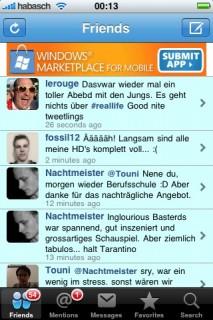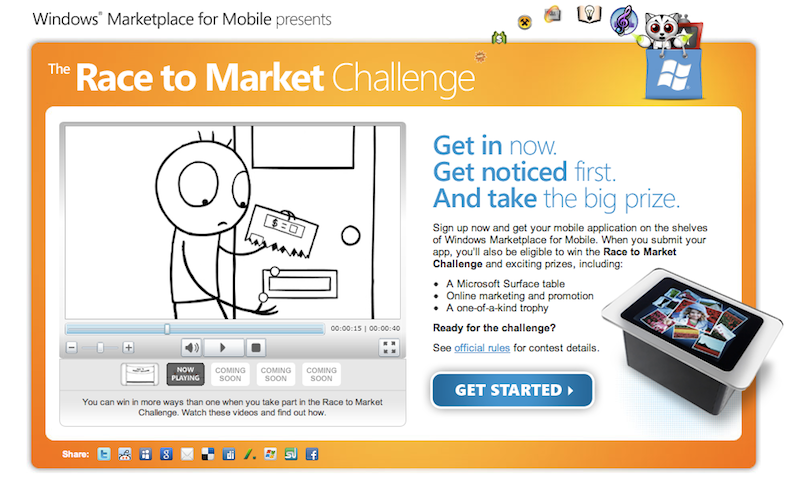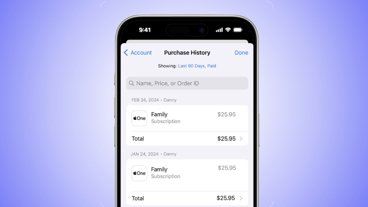Microsoft sells restrictive new WiMo Marketplace via iPhone ads
Even so, the company's new store plans to be even more restrictive than Apple's App Store, charging developers $99 per app submitted while killing off many existing WiMo titles and banning Java. Microsoft has reportedly approached some iPhone developers directly, offering them cash to port their iPhone apps to Windows Mobile. The new iPhone ads actually target app users however, encouraging them to click on the banner to "submit app."
Somewhat ironically, Microsoft is promoting its belated response to the iPhone App Store, which opened fifteen months ago, as a "Race to Market Challenge." The company's late entry into the mobile app market promises developers who participate the chance to win "exciting prizes" for submitting new Windows Mobile apps, including a Microsoft Surface table, online marketing and promotion and "a one-of-a-kind trophy."
$99 per submission
Microsoft's development program is patterned after Apple's in some respects, with the same $99 annual fee to participate in its program as a registered developer. However, Microsoft will also be charging an additional $99 fee per application submitted for both free and paid apps, after an initial grace period through the end of 2009 that permits five free app submissions.
"We will run a rigorous certification process to ensure an optimal end user experience, and that the device and network resources are not used in a malicious way," Microsoft says in its Marketplace information page. "This certification process bears a significant cost. We believe that $99 is an acceptable cost of doing business, in order to gain access to millions of customers interested in purchasing applications."
Apple does not charge developers any additional fees to submit their apps, which has resulted in a crushing submission approvals workload that has left a few dozen developers publicly enraged by delays and inconsistencies in the approval process. The vast majority of the 75,000 applications in the App Store library are approved within two weeks, and at no cost, by Apple's staff of reviewers. In July, Apple reported to the FCC that it handles 8,500 app submissions and updates every week.
Microsoft's store rules tells developers, "if your app is rejected, you will receive an adequate explanation and any associative tests or policy rules that have failed. As the developer, you are expected to address these issues before submitting the app again. Submission fees are not refundable, and you’ll have to repay the [$99] submission fee for each time you submit the app."
Additionally, "Microsoft reserves the right to remove your app from Windows Marketplace for Mobile at any time. An app may be pulled if its content is unsuitable or if the app has an unusually high rate of customer refund requests." At the same time, the company says, "you’re not required to provide support for apps that are no longer available on Windows Marketplace for Mobile."
Clarification: comments have raised questions about whether Microsoft will charge extra for each additional app update submitted, after having already paid the initial $99 (and $99 for each rejected submission). Microsoft currently says it won't charge for app update submissions, after initially stating that updates would only be free to submit when presented within 7 days of submitting the original. The original article did not fathom that Microsoft would charge for app updates.
No alternative stores
Microsoft's restrictions on Marketplace submissions have other similarities to Apple's SDK rules, including a prohibition on trying to sell other content or upgrades of any kind in competition with Microsoft's own store. This includes:
"Applications that are or distribute alternate marketplaces for content types (applications, games, themes etc.) that are sold or otherwise distributed through Windows Marketplace for Mobile."
"Applications that link to, incent users to download, or otherwise promote alternate marketplaces."
"Applications that promote or link users to a website, or contain functionality within the application itself, which encourages or requires the user to purchase or pay to upgrade the application outside of Windows Marketplace for Mobile."
Unlike the iPhone and its App Store however, Microsoft is erecting its competition-restricted software storefront for an existing platform that is already a decade old. This risks significant backlash by the WiMo software stores that have already gone into business with Microsoft's blessings, along with developers who already sell their Windows Mobile apps using an adware or subscription upgrade business model.
No mobile VoIP, no Google Voice
Also prohibited is a familiar-sounding ban against enabling "VoIP (Voice over IP) services over a mobile operator network" or efforts to "replace, remove or modify the default dialer, SMS, or MMS interface." That's clearly a preemptive strike on Google Voice, which has met similar resistance from Apple's mobile provider partners.
Apple has caught heat over its delay in approving the native version of the Google Voice app and its delisting of third party apps that tied into Google's GV service. Still, the iPhone has never been advertised as a wide open platform, as Windows Mobile is.
Additionally, Windows Mobile is already saturated with third party apps that replicate and improve upon the built in features of its interface. This makes Microsoft's attempt to set up a mobile shop modeled after Apple's a tough sell. It may even risk killing off Microsoft's existing mobile partnerships without any guarantee of solo success, just as the Zune destroyed the PlaysForSure ecosystem of media stores and hardware partners in its fruitless bid to compete with Apple's iPod. Microsoft is also expected to introduce its own new Windows Mobile phone next year, further disrupting its WiMo ecosystem of partners.
No alternative browsers, no search, no media players
Microsoft's new Marketplace rules also prohibit any apps that attempt to "change the default browser, search client, or media player on the device."
Apple has been criticized for bringing the iPhone to market as a closed device with a default browser, default links to Yahoo and Google, and its own QuickTime-based embedded media player. At the same time, when it opened up the App Store a year after the iPhone hit the market, there was little demand for an alternative browser, search client, or media player because the ones Apple provided were already among the best available on any smartphone platform.
On the other hand, Microsoft's Windows Mobile has been on the market for many years with lots of third party alternatives to its Pocket Internet Explorer web browser, search functions, and media playback app. The Windows Mobile browser is derided by even Microsoft's closest proponents, who often recommend that users download NetFront, Opera, or other alternative browsers.
Entering an established, competitive market and issuing a new prohibition on the popular alternatives everyone already uses is a big departure from what Apple has done, and a more egregiously anticompetitive step than simply bundling an option that can't be removed, as Microsoft did when it introduced Internet Explorer on Windows to kill off Netscape's browser.
No Java apps
Similarly, Microsoft's new prohibition against "Applications that run code outside Microsoft runtimes (native, managed, and widgets)" is identical in intent to Apple's rules against alternative runtimes, frameworks and plugin code that seek to avoid the use of the iPhone's native Cocoa Touch APIs.
The big difference is that Windows Mobile apps are already being written using Java and other runtimes. Sun will be surprised to find that Microsoft plans to simply wish away its JavaFX for Windows Mobile, along with the Mysaifu JVM, CrE-ME, and the phoneME runtime.
At the same time, Microsoft will also be promoting Flash Lite support in its browser, because its own Flash alternative for mobile devices isn't ready yet. Once the mobile version of Silverlight becomes available, will Adobe's runtime be similarly banned after the fact? Possibly; Microsoft says it reserves the right to modify its store rules at any time.
Other conflicts of interest
Microsoft also runs other businesses that Apple doesn't, introducing new impediments in its ability to simply copy Apple's App Store. For example, Apple has no Internet search or web advertising business. The iPhone offers users a choice between Google and Yahoo for web search, and allows third parties to introduce their own search apps; Microsoft offers iPhone developers the ability to tie into its own Bing engine, for example.
Apple also enables third parties to offer various in-app advertising programs to monetize developers' free apps. Microsoft runs its own ad business, so while it says it will allow other companies to sell ads in WiMo software, those companies will not be on an equal playing field with the platform's own vendor.
Microsoft also runs its own mapping services in competition with Google, another example of a business Apple where remains neutral on the iPhone. Third party iPhone apps can and already do both draw upon Google Maps or use Microsoft's instead.
Prospects for the WiMo Marketplace
Microsoft's rigid new rules don't seem to take into consideration the company's shrinking share of the smartphone market. In the most recent quarter reported by Canalys, Windows Mobile has fallen into fourth place globally with just a 9% share.
Just a few years ago, Microsoft could claim nearly a quarter of the global market for smartphones. Now it can't even claim that big of a slice of the American market. The US the market is now dominated by RIM and Apple, which own a combined 75.3% of the market. With its window of opportunity squeezing shut, new store rules that pinch off existing developers and crush competing stores are not likely to help Microsoft turn its game around.
At the same time, Microsoft won't be able to leverage the existing installed base it does have because its new Windows Mobile Marketplace requires Windows Mobile 6.5. The vast majority of existing WiMo phones are not eligible for any type of upgrade to the new operating system, apart from a few models Microsoft highlighted back in February as being specifically designed to run the new 6.5 update, such as HTC's Touch Pro2 and Diamond2.
This limits the potential audience for Microsoft's new Marketplace store to users of select WiMo phones sold this year. It also alienates many buyers who have invested in expensive WiMo devices over the past year or two, many priced in the neighborhood of $700. Some of those users can risk bricking their device to install an unauthorized, unsupported WiMo 6.5 ROM image, but there's no general upgrade option.
Zune, meet Windows Mobile
Microsoft is also doing nothing to bind its Windows Mobile smartphones together with Zune sales to create a larger, unified software market for Windows CE-based devices. The Zune team isn't even really operating a software store, but instead only allowing a few select developers to offer free software titles. While the Zune HD packaging highlights its ability to play games, there will be no real market promoting the creation of games for users to play.
Brian Seitz, the Zune's marketing manager, says the Zune HD is focused on music and video playback. That's a particularly strange position for Microsoft to take, given that the company has heavily promoted PC gaming and literally poured billions into its Xbox franchise just to establish a position in the console gaming business. When asked about the company's Zune HD software store plans in relation to new WiMo Marketplace, Seitz, spoke of Windows Mobile as if it were a different company.
"Right now our product roadmaps didn't line up perfectly for us to snap to what they're doing [in the Windows Mobile Marketplace] or vice versa. That being said, we know people want things like this on their devices so we're going to build them ourselves, they're going to be super high-quality, and they're going to be free. Down the road if there's a way we can work with Windows Mobile or another group inside the company that's building an app store and take advantage of that, that's something we'll look into."
In contrast, Apple still officially supports every iPhone and iPod touch ever built since 2007 with its latest iPhone 3.1 software and in the App Store, resulting in an installed base of 50,000,000 devices for iPhone developers to reach. That has created a library of 75,000 apps, including over 21,000 games. It's no wonder why Microsoft is working to get their attention.
 Prince McLean
Prince McLean















 Amber Neely
Amber Neely
 Thomas Sibilly
Thomas Sibilly
 AppleInsider Staff
AppleInsider Staff
 William Gallagher
William Gallagher
 Malcolm Owen
Malcolm Owen
 Christine McKee
Christine McKee










100 Comments
Big Brother vs. Big Brother in the octagon.....gotta love it....
Well I guess this is appropriate then for Microsoft. "FAIL"
The $99 submission price will be annoying for developers if they have to keep paying for each submission. But at the same time it could be good for everyone:
1. One of my hates about the app store is there is so much crap, this would stop a lot of crap being submitted
2. Compared to how much an app should actually make $99 isn't a whole lot of cash
3. If there's a financial risk of submitting an app that isn't really ready developers will do it less
On the whole I think this may just help filter out a lot of the crap that makes it onto Apples App Store, as there will be less people just submitting something they made in a few hours in the hope it will make money.
When asked about the company's Zune HD software store plans in relation to new WiMo Marketplace, Seitz, spoke of Windows Mobile as if it were a different company.
That's just how Microsoft works, rather than operating as one company with one vision and going down one path. Microsoft divides its workforce up often lets different teams work on effectively the same idea just to see who does a better job and goes with that. It's an odd approach but as innovation is hard for big companies (hence Apple and Microsoft both buy a lot of the ideas they come out with) its a good way to try an ensure your products are going to be better.
Typical MS treatment of their partners.
I wonder of the same 'softie trolls will come out for this article too. You know, the ones who had less than 5 posts and were probably paid by Microsoft to spew their talking points here?